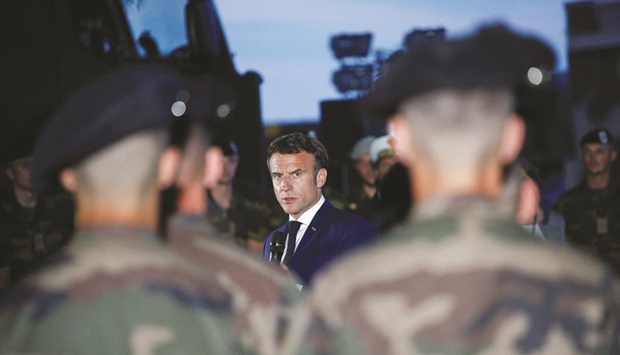French President Emmanuel Macron appealed to voters yesterday to give him a “solid majority” in Sunday’s parliamentary polls, warning against adding “French disorder to global disorder.”
Speaking as he departed from Paris to visit French troops dispatched to Romania in response to Russia’s invasion of Ukraine, Macron said “the months ahead will be difficult” but called for people to back him in the name of “the higher national interest” and “common sense.”
Macron’s visit this week to Romania and neighbouring Moldova has come under fire at home, landing ahead of the second round of crucial parliamentary elections in which his centrist majority is at risk.
“Emmanuel Macron has planned a trip abroad for three days... after anaesthetising the campaign by refusing any debate, he saw the second round as a done deal,” Jean-Luc Melenchon, leader of the left-wing NUPES alliance, told Le Parisien daily.
The incumbent had already been charged by opponents with sitting out April’s presidential vote, bringing home a solid but unspectacular win against far-right chief Marine Le Pen.
Appearing to bet on a similar strategy in this month’s parliamentary poll, his Ensemble (Together) alliance suffered in Sunday’s first round while NUPES and the far-right made gains.
Projections suggest voters could hand Ensemble 255-295 seats in the second round — uncomfortably low compared with the threshold for an absolute majority of 289.
Macron’s Elysee Palace office said that in Romania the president would send “a clear message of our commitment to our Nato allies and European partners” following Russia’s invasion of neighbouring Ukraine — highlighted by France’s 500-strong deployment in the country.
There have even been press reports, unconfirmed so far, that Macron could make his first visit to the Ukrainian capital Kyiv since the assault began in February, alongside German Chancellor Olaf Scholz and Italian Prime Minister Mario Draghi.
But “people (in France) are really worried about petrol, purchasing power, not about him going to visit French soldiers abroad,” one anonymous parliamentary candidate for Ensemble complained to Le Parisien.
Macron acknowledged yesterday the “disorder in our everyday lives,” telling voters “you’re already paying more for your gas, your petrol, your groceries, and the months ahead will be difficult.”
“In these troubled times, the choice you have to make this Sunday is more crucial than ever,” he added, calling on both people who voted for other candidates and non-voters to rally behind him.
While the campaign has been dominated by inflation and other economic impacts of the Ukraine war, the left is also trying to make it a referendum on Macron’s plans to raise the minimum retirement age to 65 as part of a pensions overhaul.
But all sides have struggled to get voters excited about the poll, with just 47.5% turning out on Sunday, the lowest ever in a first-round parliament election.
Since reforms to the electoral calendar in the early 2000s, interest in the legislative vote — which follows on the heels of the presidential poll — has dwindled, as it has always given the head of state a handy majority.

French President Emmanuel Macron speaks to soldiers of the Nato Response Force as part of Mission AIGLE, upon his arrival at the Mihail Kogalniceanu Air Base, near Constanta, Romania yesterday. (Reuters)
